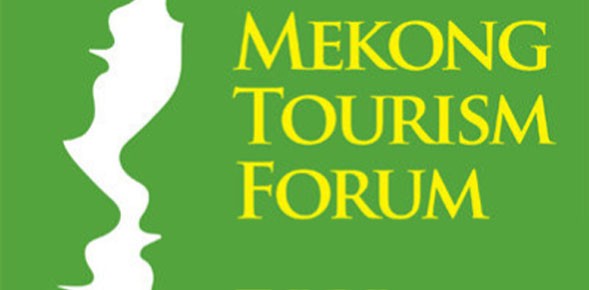The outgoing Mekong Tourism Forum in Chiang Rai highlighted the achievements of 20 years of Greater Mekong tourism development. But it also bears risks of an uncontrolled growth with irreparable damage to the environment.
Taking place in Chiang Rai in Northern Thailand on June 13 and 14, the last Mekong Tourism Forum was organized by the Mekong Tourism Coordinating Office and was an opportunity for participants to look back at 20 years of tourism evolution since the creation of the GMS (Greater Mekong Subregion). Achievements over the period are certainly remarkable. “The most remarkable achievement is certainly to have helped alleviating poverty and create jobs for over six millions of people in this part of Asia, especially towards women, youth and ethnic minorities,” explained Mason Florence, Executive director of the Mekong Tourism Coordinating Office who organized the event. Last year, some 35 million travellers were recorded in the six countries/regions shaping the GMS (Cambodia, Laos, Myanmar, Thailand, Vietnam as well as Chinese Provinces of Guangxi and Yunnan). The tourism sector contributes over US$30 billion in annual receipts to GDP annually.
Also on a positive note, the progressive reintegration of Myanmar into the world’s community is likely to further boost the attraction of the region for international travellers. According to Olivier Jager, CEO of ForwardKeys.com, latest information collected from 200,000 travel agencies worldwide show that hotel bookings for the GMS region were 13% up for July and 19% up for August 2012. Bookings for Myanmar alone are up 54% for June-August 2012 compared to the same period of 2011.
But there is a more negative side to Mekong tourism’s evolution. And in contrary to many other international conferences, the Forum did not hide some of the less rosy aspects of tourism’s development in the region. Such as children sex tourism for example. It still plagues the region, despite prevention campaigns and tougher laws to prosecute people practicing it. “Child exploitation came to light 30 years in Thailand. It rose awareness through international conferences and various measures adopted by some governments to curb children exploitation. In 2012, despite all the legislation to prosecute travellers involved in sex with children, the problem is still there. However its nature has changed. You don’t see children in brothers but you see them in the streets, begging, selling flowers or working in restaurants. We must protect children as they are our future and as they can’t take care of themselves. This is our duty,” said an impassionate Afrooz Kaviani Johnson, Technical Director at Project Childhood-Prevention Pillar, World Vision.
Another worrying trend is the over-exploitation of natural resources and a slow destruction of the environment or indigenous cultures for the sake of developing tourism.
In his opening speech, MR Disnadda Diskul, Chairman of Doi Tung Development Project made also a plea to develop projects for the sake of the people and not just by pure greed. “We are living in an area of radical capitalism with a leniency of getting more, more and more. Most politicians look only at GROWTH, the new god of our time. But it has nothing to do with a good quality of life for the public. Global credo for economic growth conducted then to losses in environment, equality, social environment and even in weather pattern: “Don’t just look at tourism as a business opportunity, but as a responsibility and means to eliminate poverty” he told the audience. Doi Tung Royal Project hopes to be a benchmark in terms of development focusing on available resources and the empowerment of local people. “Ultimately by 2017, local communities will be in charge of the future management of Doi Tung,” added MR Disnadda Diskul.
Over-development is on the way with many mega- projects already approved in countries such as Laos and Cambodia. “We are looking at the experience of our neighbours and are very conscious that a sustainable development respecting our cultures must be the base of our tourism framework policy,” highlighted Daw Kyi Kyi Aye, former Director of Tourism in Myanmar and today an adviser to Myanmar Minister of Hotels and Tourism. Students asked by Scott Smith from Youth Skål stressed also that despite the positive perspectives given in terms of travel capacities and better life standards, uncontrolled development was a huge challenge to task.
Phawat Cruz, a student working currently with Thailand Ministry of Sports and Tourism declared to see many mistakes over the development of tourism. “I see a lot of problems conducting to crimes, environment pollution, loss of cultural identities for ethnics, fake products developments, fraud and unethical conducts with visitors. It all contributes to create a bad image of countries”, he explained. Athit, another student, felt also concerned about the construction of dams in the Upper Mekong on the Chinese side. “How will fishers and local communities survive if Mekong resources are depleted through those constructions?” he pointed out. Without being named, China’s own development agenda casts a shadow over the region and generates anxiety for many tourism stakeholders in the region…
Taking into consideration the quest for sustainable development, the Asian Development Bank(ADB) will focus more on ‘software’ investments such as training and education compared to ‘hardware’ investments in roads, bridges and concrete infrastructure, which characterised the institution’s involvement in the sub-region over the last two decades.
“There’s a new urgency to GMS proceedings,” acknowledged MTCO Executive Director, Mason Florence. “While arrivals and earnings are up, Mekong tourism stakeholders are also hungry to grow sustainably. The GMS member countries are sharing their best practices more than ever before to safeguard their tourism future,” he said. The next MTF will take place in 2013 in Mainland China…
Luc Citrinot a French national is a freelance journalist and consultant in tourism and air transport with over 20 years experience. Based in Paris and Bangkok, he works for various travel and air transport trade publications in Europe and Asia.




![[PR] PR_Ascott and Vimut Hospital_2024](https://www.traveldailynews.asia/wp-content/uploads/2024/04/PR-PR_Ascott-and-Vimut-Hospital_2024-400x265.jpg)




























































